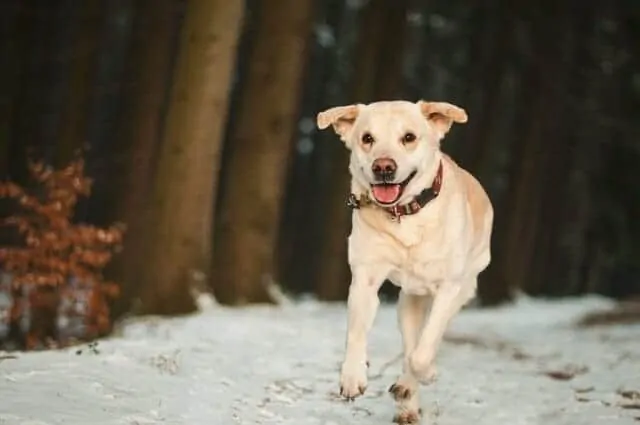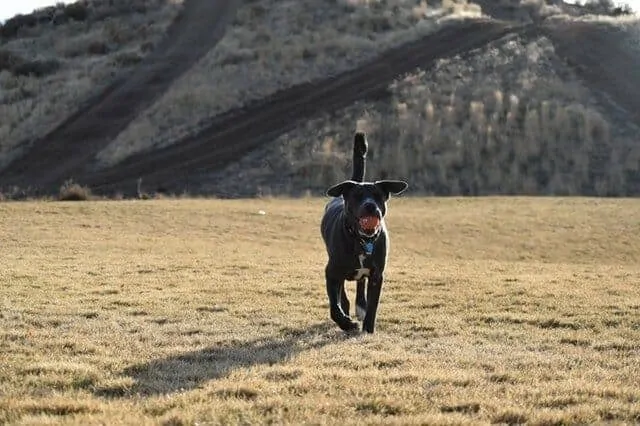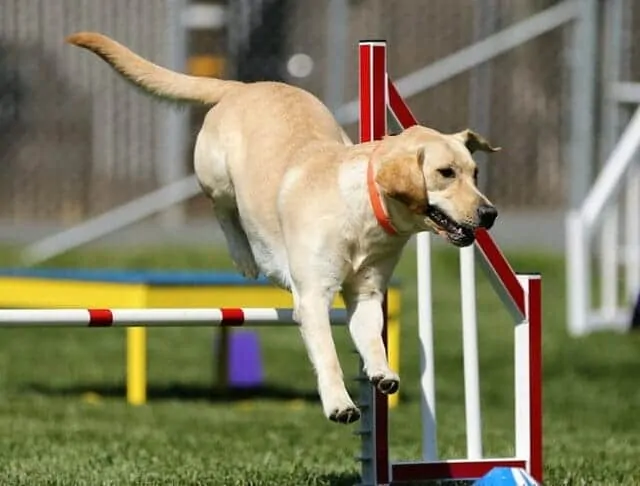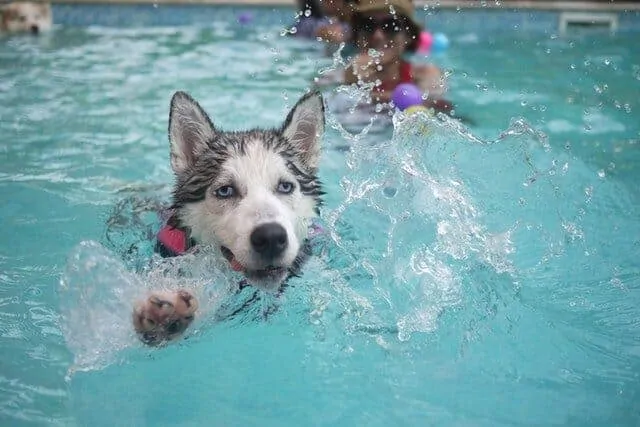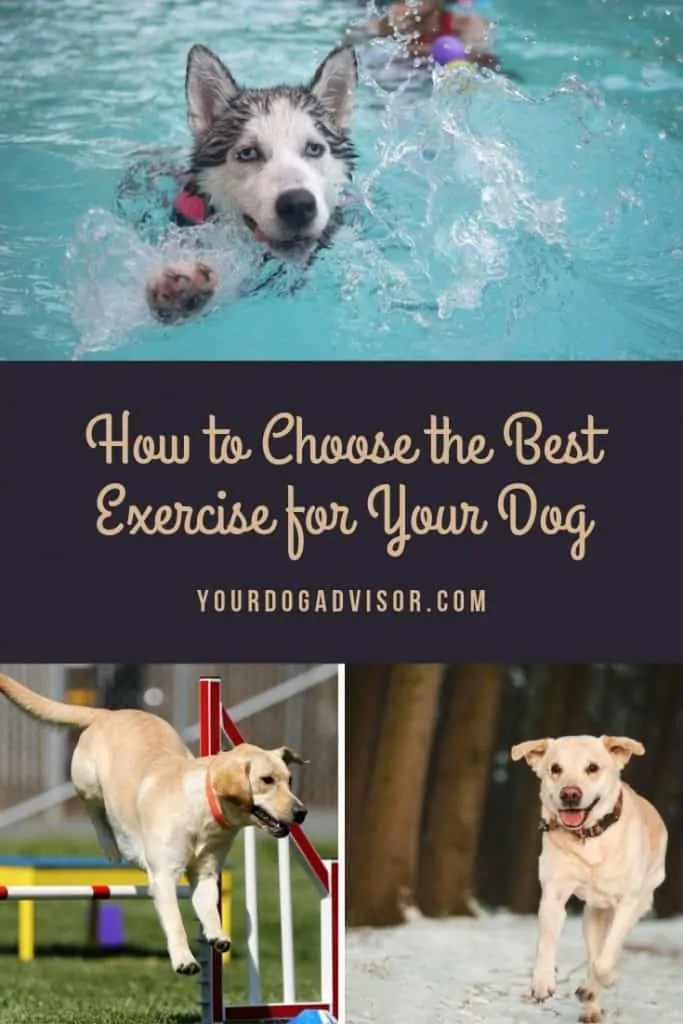While walks to the nearby dog park are never a bad thing, sometimes dogs need more of a challenge. Doesn’t matter if you have a dog who loves water or one who can run for miles –choosing the right sport for him is essential to make sure he stays fit, has fun and doesn’t get injured.
Here are some tips on how to choose the perfect sport for your dog.
Contents
Running
Whether you’re a seasoned runner or just thinking about taking up jogging, having a canine companion can be a lot of fun.
However, just like running isn’t right for every person, it’s also not the right sport for every dog. For example, running isn’t ideal for dogs who are too young, as their bones are still growing and the impact could be damaging, according to the AKC. Senior dogs might not be up for running either, especially if they’re suffering from joint issues.
Aside from age, there’s also your dog’s temperament and body buildup to consider. Certain breeds, such as huskies and large hunting/work breeds (like Weimaraners and Border Collies) are naturally suited to running, as they have longer legs, great stamina, and the proper snout length to make heavy breathing easier. On the other hand, dogs with flat faces (think Pugs and Boxers) can easily overheat when running, making the sport dangerous for them.
If you have no idea if running is right for your dog, you can always give it a try. Start slow, on a day when it’s not too hot or too cold and see how your dog does. You can’t expect an untrained dog to be able to run two miles on his first try, but if your dog is still ready to keep going and super excited after a half mile run, this could just be the perfect sport for him.
Best For: Large hunting/work breeds such as huskies, Weimaraners and Border Collies (they are naturally suited to running, as they have longer legs, great stamina, and the proper snout length to make heavy breathing easier).
Less Suited For: Dogs with flat faces such as pugs and boxers (they can easily overheat when running, making the sport dangerous for them).
If you want to run with your dog, make sure you start slowly to give his body time to adjust
Hiking
If you have an active dog who isn’t quite up to running, he might be better suited for hiking. The best hiking dogs are working breeds with a sense of adventure – if you have a dog who will just keep going and going as long as there’s something to smell, investigate and discover, you might have the perfect hiking companion.
Good hiking dogs are usually sociable, lively and always up for joining their human companions, whatever they’re doing. And while good running dogs tend to be medium to larger, good hiking dogs come in all sizes.
Hiking is also ideal for dogs who are scent-oriented – meaning there’s just nothing better for them than smelling the world around them. Your dog’s sense of smell uses a lot of brain power, which is why nose work (training games that require your dog to find things using his nose) can tire out even the most active and hyper of dogs, according to the West Suburban Humane Society. If you have a dog that just puts nose to the ground as soon as you step outside, hiking and all the new smells along the way can provide an amazing workout for both his body and his brain.
Best For: Terriers (and any mixed dog with a bit of terrier in him) because they have boundless energy and hiking can be the perfect way to tire them out; working breeds that are always curious, such as Labrador Retrievers and Australian Cattle dogs.
Less Suited For: Dogs with flat faces such as boxers, bulldogs, and pugs (it’s harder for them to keep their breathing under control after a very long walk) and dogs with short legs such as Dachshund, English bulldogs, and Welsh Corgis (they might not be able to handle steps, steep hills, or the rocky terrain you often find during a hike)
Hiking is great for dogs of all sizes and you can keep it low-impact or make it more intense depending on speed, length and terrain
Catch and Frisbee
If you have a dog who will bring you back a ball 100 times without ever getting bored, you probably have a dog who will love playing Frisbee – also known to professionals as “disc dog sport.”
An activity that requires agility, speed, and fast reflexes, this is a great choice for quick dogs who love to jump, are already fit, and have tons of energy. During formal competitions, disc dogs are awarded points based on how many times they can catch the disc in 60 seconds, how high they can jump to catch it, and even for choreographed routines they perform with their owners.
But even less-than-gracious dogs can get a lot out of this sport, as it gives them a “job,” enhances the bond you two have, and uses up a lot of energy in a short period of time.
Best For: Lean medium-size dogs such as Border colliers (they have the right leg length, are built for power jumping and never seem to run out of enegy)
Less Suited For: Dogs with flat faces or short legs, such as Basset hounds, dachshunds and pugs.
For very active dogs, catching and retrieving activities like Disc Dog sports can be a great option
Agility Sports
Working breed dogs often excel at agility competitions for one simple reason: they were born to solve problems, love to have fun, and have endless energy. But agility work can be great for any dog, as it’s a great workout to boost self-confidence and strengthen the bond with your dog.
Have a dog who’s always getting in trouble because he’s bored? Agility might be the answer, as it tires dogs both physically and mentally so your pooch doesn’t get in trouble again as soon as you turn your back.
Agility requires some work, so you might do well searching for a local training place where you can at least learn the basics to then practice on your own. If you have a yard, you can even build your own agility course using common materials such as PVC pipes, wooden planks, and a collapsible children’s play tunnel from your local toy store.
Best For: Working, medium-size breeds such as Border collies, Australian shepherds, and standard poodles (these are full-of-energy breeds that love completing tasks and pleasing their owners)
Less Suited For: Large breeds such as mastiffs and Great danes (the impact of the jumping might be a little too hard on their joints), flat-faced dogs such as Boston terriers and English bulldogs (they might have trouble with their breathing throughout the workout)
Agility is a great way to keep your dog’s mind busy and his body in shape
Swimming
First, let’s get something out of the way: it’s not true that dogs can naturally swim and it’s also not true that all dogs can become good at it even if you spend a lot of time practicing.
In fact, some breeds like pugs, boxers, bulldogs and basset hounds are just not natural swimmers at all and will have a hard time in the water because of their anatomy (top-heavy with large chests, short and stubby legs) or flat facial features.
On the other hand, if you have a dog whose name contains a water-related word (Portuguese Water Dog, Chesapeake Bay Retriever), has webbing between their toes or has a water-resistant coat, chances are he’ll love the water.
Hunting and rescue breeds often make great swimmers as well and so do mixed pups where at least some of the dog’s DNA comes from one of these breeds.
In addition to being natural for some dogs, swimming is also great for older dogs or dogs with joint issues who cannot walk long distances for exercise – water activities not only help fight stiff joints, but also keep ligaments flexible and help prevent obesity in dogs that otherwise wouldn’t get much exercise.
Best For: Large Hunting / Work Breeds (eg. A, B, C)
Less Suited For: Dogs with Flat Faces (Can overheat when running – eg. A, B, C), .
Swimming is a low-impact sport great for older dogs, dogs with joint issues and any pooch who loves water

Jen Jones is a professional dog trainer and behavior specialist with more than 25 years of experience. As the founder of ‘Your Dog Advisor’ and the ‘Canine Connection’ rehabilitation center, she applies a holistic, empathetic approach, aiming to address root causes rather than merely treating symptoms.
Well known for her intuitive and compassionate approach, Jen adopts scientifically-proven, reward-based methods, encouraging positive reinforcement over punishment. Jen specializes in obedience training, behavior modification, and puppy socialization. Her innovative methods, particularly in addressing anxiety and aggression issues, have been widely recognized. Jen has worked with many of the world’s leading dog behaviorists and in her free time volunteers with local animal shelters and rescue groups.
